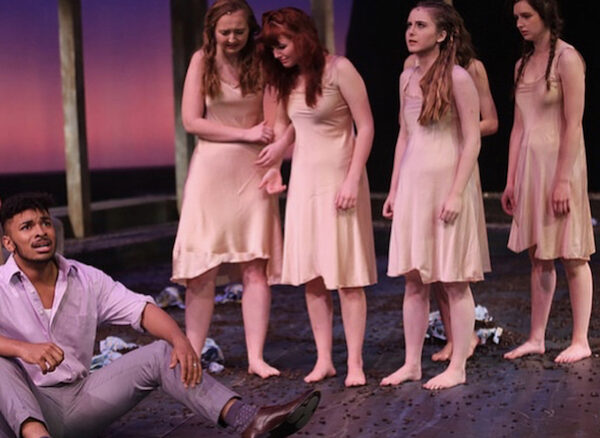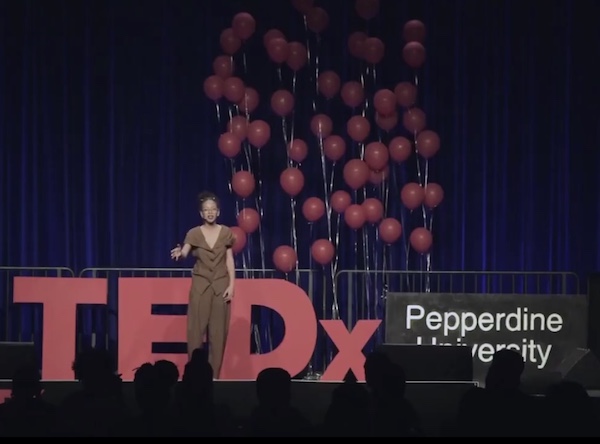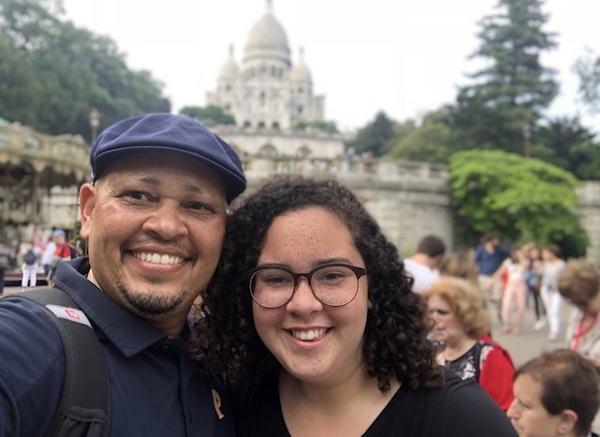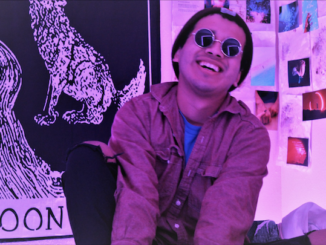
After the Black Lives Matter protests sparked in June, the @BlackatPepperdine Instagram page brought several instances of racial injustice on the Pepperdine campus out of the shadows.
Many posts spoke to the privilege white students and professors have at a predominantly white institution, and to how the white majority often excludes Black students.
For Black students and other students of color, the reality of white privilege is something they encounter every day. But they also regularly encounter white students who are in denial of their privilege.
“There’s this metaphor that’s like, ‘there is a fish out of water who doesn’t know what water is and if you point it out to him, he wouldn’t know what the hell you were talking about,’” said George Edward Preston IV, senior theatre major with an acting emphasis. “I think the same is true for white people.”
There are many types of privileges people can have. White privilege is one of them.
“White privilege is the inherent advantage possessed by a white person due to their race in the world with racial inequality and injustice,” Sociology Professor Bryant Crubaugh said. “It is about how white individuals have both historical and contemporary advantages.”
Pepperdine students and faculty debate white privilege and what its impact is on campus. For students of color, it’s just one piece of their work to press toward more inclusion among the student body.
Pepperdine students seeing white privilege on the daily
Ever since George Floyd’s death at the hands of police, students of color have been speaking out about their disadvantages due to white privilege. For many of these students of color, white privilege is a cultural norm on campus.
Someone posted about an experience Preston had as a member for the Pepperdine Student Players, a student-run theatre club. Preston originally won the lead role in a play called “21 Chump Street.” It tells the true story of Justin Laboy, a high schooler of color, who went to jail for a drug deal after an undercover cop set him up.
However, the student producers insisted on recasting the role to go to a specific white student instead, according to Preston and the @BlackatPepperdine post. The show ended up never happening.
Preston said the theatre directors called to “apologize” to him after the post went up. They wanted to assure him that this was not actually what happened and that whoever posted this was lying.
“I forgot that happened to me because I’m pretty much used to stuff like this happening in the theater world,” Preston said. “So in a way, I just brush it off and just keep doing my other shows.”
Preston saw white privilege in their reaction to the post.
“Avoiding the responsibility of acknowledging what you’ve done in order to save grace, making yourself the victim when you don’t focus on the person of color’s experience and you make it about you, that is a form of white privilege,” Preston said.
Preston’s experience resonated with other Pepperdine students.
A Student in Seaside hung up a Confederate flag that was visible from the parking lot, which offended many students.
“People would see that and be like, you know, this is the flag that was hanging over my grandfather’s body as he was lynched or this is the flag that, you know, lets me know what spaces I cannot exist in and be respected as a human being,” 2020 graduate Olivia Robinson said. “The person ended up being allowed to keep their flag up and that brought up a lot of conversation on what is tolerated and accepted on this campus.”

Amanda Cornish, a senior liberal arts major, has experience with both sides of white privilege.
People often assume Cornish, who is half Black and half white, is white because of her fair skin complexion. Her dad, who is fully Black, often gets treated differently than her due to the color of his skin.
“I can think of countless situations in which I have benefitted by the color of my skin,” Cornish said. “My dad is fully Black and when we are out in public people will clutch their purses close to them, whereas that doesn’t happen to me.”

Cornish also has two adopted younger brothers who are Black.
“Growing up, when I was going to the stores with my brothers and stuff and having the store managers look at me like, ‘Hey, make sure to control them’ and never ‘Hey, what are you doing in my store’ directed to me was where I could see white privilege present,” Cornish said.
Many students believe that because there is a 50% population of white students at Pepperdine, it might be hard for white students to acknowledge white privilege.
“Privilege is blinding if you have it,” Robinson said. “You’re not obligated to consider a world in which privilege doesn’t exist.”
Despite students sharing their experiences with racism on campus, privilege still continues to be blinding.
“At first you would say Pepperdine is a predominantly white school,” Sahej Bhasin, sophomore business administration major, said. “But when you look at the way that students of color are recounting their experiences with other white students with them saying racial slurs or making them feel left out of different events all because of the color of their skin, it is evident that white privilege does exist at Pepperdine.”
Despite students of color raising their concerns on racial issues on campus, they still believe their voices are being pushed under the rug.
“I think Pepperdine as an institution is not good at addressing at all,” Cornish said. “Like not good at addressing racial tensions or their own faults in their shortcomings in the area of in racial injustice, of white privilege, and of white supremacy.”
Denial of white privilege
People of color have expressed their disadvantages due to white privilege for years but some white people continue to deny it.
According to experts, white people deny their privilege for many reasons, such as wanting to be treated as an individual, believing in a meritocracy, or from events from their own personal experiences.
“When we talk about white privilege it’s not a very intersectional approach,” Crubaugh said. “So I think some of it is saying, ‘I’ve had a hard economic time. I might come from a working class white family that led to some disadvantages in my life.’ So when you talk about white privilege sometimes people will react by saying that, ‘it doesn’t explain all of my experience. I haven’t had all of the advantages that other white people have had.’”
White individuals deny their privilege due to hardship in their life despite being presented with their privilege, Stanford researchers L. Taylor Phillips and Brian Lowery found in a study.
“Yes, maybe some part of you has been disadvantaged because of some intersectional reason around education, ability status, gender or whatever else,” Crubaugh said. “But you’ve had an advantage when it comes to race that other people with your other identities haven’t had.”
Crubaugh said the denial of privilege amongst white individuals can be detrimental for the progression of society.
“Recognizing white privilege is important in order to do something about it, not to take away people’s advantages but to address those disadvantages that push other groups behind us,” Crubaugh said.
The importance of recognizing white privilege
The topic of white privilege may be “uncomfortable” to many and potentially even offensive, Crubaugh said. But he does not think the term should be changed.
“I think changing the term to something less controversial, potentially less offensive or politically charged is really accommodating those that are being advantaged,” Crubaugh said. “Instead of addressing something that might make people uncomfortable, but that is actually at the root of the problem.”
Crubaugh believes that though the term is controversial there is a valuable impact in it sparking a conversation of change.
“I think there is benefit to the term white privilege being controversial,” Crubaugh said. “But that does shut people off from the conversation. I think instead of changing the term white privilege we need to ask if there are ways to bring people into that conversation that are easier or a little bit more of an on ramp that could be beneficial.”
White privilege is a very hard topic to fully grasp, especially if it is not something someone has personally experienced.
“Unless you’ve lived in a person of color’s body, you won’t know what it’s like to be in that body or how the world reacts to you in a certain way,” Crubaugh said. “I can read as much as I want and can but I will never understand that. I can have as many conversations as I can with people that are a different color than me and I will still not understand what it’s like to walk around in a different body.”
However, even though it is a topic one might never fully understand, there is no excuse to ignore it, he said.
“I think everyone needs to have diverse communities and to engage in academic material and interpersonal relationships to try to understand differences as much as we can even though it’s not easy,” Crubaugh said.
Crystal Chainani completed the reporting for this story in Jour 241 in Fall 2021 under the supervision of Dr. Christina Littlefield and Dr. Theresa de los Santos. Dr. Littlefield supervised the web version of the story.




